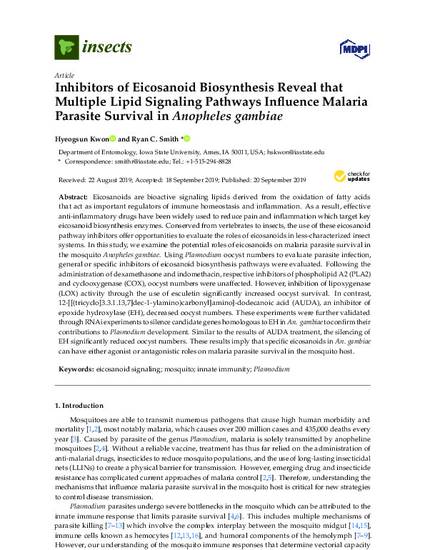
Eicosanoids are bioactive signaling lipids derived from the oxidation of fatty acids that act as important regulators of immune homeostasis and inflammation. As a result, effective anti-inflammatory drugs have been widely used to reduce pain and inflammation which target key eicosanoid biosynthesis enzymes. Conserved from vertebrates to insects, the use of these eicosanoid pathway inhibitors offer opportunities to evaluate the roles of eicosanoids in less-characterized insect systems. In this study, we examine the potential roles of eicosanoids on malaria parasite survival in the mosquito Anopheles gambiae. Using Plasmodium oocyst numbers to evaluate parasite infection, general or specific inhibitors of eicosanoid biosynthesis pathways were evaluated. Following the administration of dexamethasone and indomethacin, respective inhibitors of phospholipid A2 (PLA2) and cyclooxygenase (COX), oocyst numbers were unaffected. However, inhibition of lipoxygenase (LOX) activity through the use of esculetin significantly increased oocyst survival. In contrast, 12-[[(tricyclo[3.3.1.13,7]dec-1-ylamino)carbonyl]amino]-dodecanoic acid (AUDA), an inhibitor of epoxide hydroxylase (EH), decreased oocyst numbers. These experiments were further validated through RNAi experiments to silence candidate genes homologous to EH in An. gambiae to confirm their contributions to Plasmodium development. Similar to the results of AUDA treatment, the silencing of EH significantly reduced oocyst numbers. These results imply that specific eicosanoids in An. gambiae can have either agonist or antagonistic roles on malaria parasite survival in the mosquito host.
Available at: http://works.bepress.com/ryan_smith1/19/

This article is published as Kwon, Hyeogsun, and Ryan C. Smith. "Inhibitors of Eicosanoid Biosynthesis Reveal that Multiple Lipid Signaling Pathways Influence Malaria Parasite Survival in Anopheles gambiae." Insects 10, no. 10 (2019): 307. doi: 10.3390/insects10100307.